
CHAPTER 8
PURSUE HEALING
TO BE ABLE TO ENJOY SEX, listen to your body, lead by invitation, and be free to say no so you can enthusiastically say yes, you must first heal from any past or present hurts.
Women cannot fulfill their potential for sex in marriage until they have healed sexually. A woman needs healing if she:
- was sexually or physically abused as a child
- was a victim of trauma
- was raised in an alcoholic home
- was in an abusive relationship as an adolescent or adult
- was raped
- has physical pain during sex
If this is true of you, you will need to take the time and do the work needed to heal those wounds.
Elizabeth in our Magic and Mystery of Sex DVD series was the daughter of an alcoholic father and was sexually abused by her brothers while growing up. Her interest in sex shut down within weeks after she and Eric married. This pattern is typical for women who have been sexually abused in the past. Elizabeth also tenaciously resisted getting into a sexual experience with Eric. In fact, she would cause a fight to avoid sex.
If you have been hurt in the past like Elizabeth or are hurting now, it is unlikely that you can do this work of healing alone. You may need therapy provided by a professional counselor or psychologist trained in sexual therapy, as well as medical treatment, help from your husband, and ongoing participation in a group connection such as “Celebrate Recovery.”[38] You will definitely need to depend upon God and support from other believers in your community as you begin your healing journey.
In this chapter, we’ll explain how marital sex is affected by each of the following hurts: arrested sexual development; sexual demand and being married to an insecure, sexually needy male; past abuse experience; growing up in an alcoholic or emotionally out-of-control home; anger, shame, or guilt; inability to let go orgasmically; and physically painful sex.
Hurt: Did Not Master a Stage of Sexual Development
Based on hearing and reading many sexual histories, we have defined the stages of sexual development that need to be mastered, the learning of each stage, the parents’ role, and the impact on adult sexual adjustment. This information is developed more fully in our book Sex Facts for the Family, available through www.passionatecommitment.com.
Stage |
Critical Learning |
Parents’ Role |
Impact on Sexual Adjustment |
Infancy |
Bonding |
Attachment parenting |
Capacity for intimacy |
Toddlerhood |
Touching, naming & control of genitals |
Affirm genitals & feelings as God’s special design; use correct names |
Positive acceptance of genitals (user friendly) |
Preschool |
Question-asking, modesty |
Reinforce, reflect, review, respond, repeat, respect nudity |
Open communication about sex with high regard for bodies |
School age |
Exploring |
Affirm curiosity; set boundaries; protect from abuse |
Sexual awareness with boundaries and without shame |
Pre-adolescence |
Erotic feelings & bumbling discovery |
Prepare for changes; protect from pornography; affirm God-given responses; systematic education |
Self-acceptance & competence in relating to opposite sex |
Adolescence |
Decision-making |
Share values; guide decision-making; listen! |
Accept feelings; control actions |
If you did not master one of these stages effectively, you may have come to adulthood with unhealthy sexual patterns. We have observed that the earlier in the developmental stages mastery is arrested, the earlier in the sexual process the response is interrupted and the more intense is the work needed to fill that gap.
Infancy: If you didn’t bond and attach to a caregiver (usually your mother) during your first year of life, you may have difficulty with the intimacy of sex and may lack desire for sex with your spouse.
Toddlerhood, Preschool, and School Age: These are the curious years. If you were shamed for being curious about sex, you may connect sexual feelings and responses with shame and guilt—sex may only feel good when it is wrong.
Preadolescence and Adolescence: If your first sexual response of orgasm or ejaculation was triggered by an external stimulus such as pornography, you still may need that stimulus to be able to respond. Women who experienced their first orgasm in response to finding pornography with pictures of nude women, for example, may need to fantasize about women’s breasts or genitals to be orgasmic during sex in marriage. This leaves the woman in a lose-lose situation: She either chooses not to orgasm and is left frustrated, or chooses to emotionally leave her husband for her fantasy and is left feeling empty and guilty.
Hurt: Sexual Demand
Sexual demand is experienced in many ways.
It may be that you place demand on yourself to feel or respond in a certain way. It is common for women to enter into the “spectator role”—to watch and evaluate how they are doing during sex. They mentally stand outside the sexual experience rather than losing themselves in it.
For example, a woman may become highly aroused but not be able to let go with an orgasm because she is watching and evaluating. As she gets close to having an orgasm, rather than focusing on the good feelings, she starts to watch and wonder if she is going to have one. She may think, Maybe this time. The focus is on the goal rather than on enjoying the journey as described at the beginning of Chapter 5.
It may be that you feel demand from your husband. The most subtle but tenacious demand comes from a husband who is watching his wife’s sexual interest in and responsiveness to him sexually. We have identified this pattern as the insecure, sexually demanding, or needy male. To find mutual sexual fulfillment in marriage, it’s important to recognize and correct this pattern.
An insecure, sexually demanding, or needy male is a man who grew up without the affirmation he needed from his mother or from women in dating or in a previous marriage. He came to marriage with a “hole in his heart.” He looks to fill that hole by the affirmation he will receive through his wife’s sexual interest and response to him. Sex is about meeting his needs rather than about the couple freely giving themselves to each other, which over time will stifle his wife’s desire and responsiveness.
If a wife gets the message that she isn’t meeting her husband’s needs, she begins to feel like a failure. She will try harder to please him and do what makes him happy. But a wife of a man with this kind of hurt can never fulfill his need. That’s because his need isn’t about his wife, and it isn’t about sex.
Since women are more easily aroused when they feel good about themselves, feeling like a failure is a recipe for an unhappy sex life. The more this wife tries and fails to please her husband, the less she enjoys—and the less she enjoys, the needier he becomes. It is a vicious, downward spiral.
This man’s need for affirmation must be separated from sex. Our best resource for helping a man with this type of hurt is our book The Married Guy’s Guide to Great Sex. Even though it’s written for men, we find it most helpful for a husband and wife to read out loud together. Read it not to get through it, but as a stimulus for discussion. If you read one paragraph that opens an hour-long discussion, you have accomplished the purpose of this assignment. Some sections will elicit discussion, others won’t. That depends on you. The information in this book can lead to positive changes. Here’s the essence of an e-mail we received from one wife:
First of all, let me say “thank you” for your wonderful book The Married Guy’s Guide to Great Sex. It has instigated one of the important emotional markers in my life. My husband heard you on Focus on the Family, bought your book, and read the entire book in less than a week. When I arrived home [one day], I was met with a dozen beautiful red roses and your book. He sat me down and summarized your book for me. He explained that he was relinquishing his “right,” and that he never wanted me to think of sex as a “duty” again. We are now in the process of working through your book Restoring the Pleasure, in hope of finding new ways to connect that are intimate and good for both of us.
Another couple was able to correct a problem with sexual demand, which allowed the wife to find her sexual “voice.” This couple had been married twenty years; the husband felt rejected by what they had both defined as her lack of interest in sex. The wife had been very interested in sex initially, but it seemed that regardless of her interest, it was never enough for her husband. So over time, she felt pressured and negatively evaluated by him, which did, indeed, decrease her interest in being with him sexually.
After working through the issues each of them brought to their marriage and taking them through the sexual therapy process of learning to give and receive touch and caressing without demand, we gave them each an assignment.
His role was to initiate fifteen minutes of connection per day following the prescription of our Formula for Intimacy on page 40. Her role was to initiate twenty minutes of sexual play every morning that did not need to lead to arousal, orgasm, or intercourse. This husband also needed to let his wife lead in intensity and activity, and to never take the lead or get ahead of her.
After a while, we received this e-mail from her: “My daily thoughts have been much more about feeling my own desires and needs, and I have not felt obligated. I have been feeling like I want sex every day, which in and of itself seems like a good thing, but I am concerned that I may be setting a precedent.”
We encouraged her to listen to her inner drive and enjoy it without monitoring it mentally, and to let her husband know she was doing that. We also encouraged this wife to simply enjoy the feast with her husband, while assuring her that it would not set a precedent.
Later, she e-mailed us again: “Thanks. This seems to be a great ‘problem to have.’ I have been going for it and communicating with him. It has slowed down a little, but we are still enjoying ourselves without pressure or demand.”
It’s not always that easy to turn a sexual demand pattern around. The hurts can be deep, and both husband and wife will need a great deal of empathy and space to discover how to heal.
Hurt: Past Abuse
A person who has experienced past abuse typically shows high interest in sex before and outside of marriage; that desire shuts down within marriage.
There are two reasons we believe this happens:
- Sex responses that occurred during the abuse became paired with negative feelings, so this woman can’t have or enjoy those responses with the husband she loves.
- In the abuse, she felt powerless and trapped. So she can easily feel that way once married because sex is expected and is no longer in her control.
The abuse has to be dealt with in talk therapy, in a group, through writing about it, or in any other way that will help a woman release the negative feelings of the abuse and no longer allow them to control her. A trauma therapy specialist is most helpful.
Once the abuse has been worked through, sexual retraining is helpful and effective. Here are the basic principles of this type of retraining:
- The physical involvement starts with what feels safe for the wife, and gradually builds so that she can connect with her husband and disconnect from the abuser and the abuse.
- She is encouraged to keep her eyes open and focused on her husband’s eyes.
- While going through sexual retraining, she will likely identify what triggers her flashbacks and disassociation. Those particular behaviors that happened in the abuse can be avoided with her husband, and new positive behaviors can be established as part of their loving relationship.
- She is encouraged to develop signals to interrupt any negative sexual touch or behavior immediately.
- It is important that the couple avoid an experience in which the wife feels sex is being done to her.
If you were abused, talk about that abuse with someone you trust. If you have never shared this information with your husband, we would encourage you to do so, unless you think that doing so would not be safe or he would not be able to handle it. If you can’t share with your husband, do find help. That helper will be able to guide you in how best to introduce the topic to your husband in a helpful manner.
Hurt: Adult Child of an Alcoholic
Men and women raised in an alcoholic or emotionally out-of-control home will tenaciously resist getting into a sexual experience, because they fear the feeling of being out of control.
But when they allow stimulation and become aroused, they can let go. Afterward, they shut down immediately and don’t want to have those feelings again. This can be confusing to spouses, because externally, it looks like the adult child of an alcoholic has had a wonderful time.
For these adults, letting go and being out of control is uncomfortable, even frightening. Growing up, children need their parents to provide solid, safe boundaries so that children can bounce off those secure walls. When a parent is out of control—erratic and undependable—the child internalizes the need for control far too early.
A person is most out of control during an orgasm. So a person with this type of hurt has intense sexual ambivalence due to internal conflict. On one hand, the adult child of an alcoholic wants to have sex with his or her spouse. On the other hand, this person fights getting into a sexual experience and losing control sexually. However, he or she doesn’t have difficulty letting go once arousal takes over. When we asked Elizabeth in our Magic and Mystery of Sex videos what happened once she got aroused, she exclaimed, “We have great sex!”
Adult Children of Alcoholics Sexual Resistance Graph
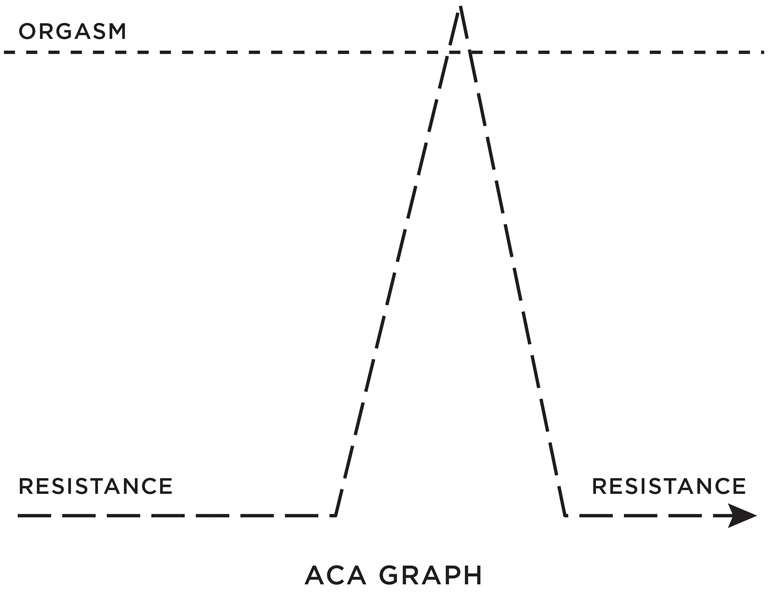
Elizabeth was able to heal when Eric, her husband, backed off completely. She was eventually able to accept his initiation of sex as she felt freed by his total acceptance.
If you were raised in an alcoholic or emotionally out-of-control home, it’s best if you can make your need for control work for you sexually rather than against you. The negative feeling of being out of control will lessen over time as you take control of your sexual times. Even though it may be difficult, we encourage you to make the decision to be sexual and go for it.
Knowing the reason behind your discomfort helps. It will also help to remind yourself that you are no longer in a situation with an out-of-control parent. Think of yourself as the adult who is in control, and talk to the child inside you, who still behaves as if her environment is not safe.
When you make the decision to be sexual with your husband, take charge of your sexual life and ask him to back off so you can use your need for control in a positive way. Schedule your sexual times. It is best to plan to have sex once or twice a week, so you don’t have time between sexual events to build up your resistance. Plan when and where sex will take place, as well as the sexual activities and what will be the best conditions for you. Even when you take charge, it is likely you will have to push beyond your resistance.
Hurt: Anger, Shame, or Guilt Have Invaded the Bedroom
As one woman explained: “He doesn’t care about me until we get into bed. I’m so hurt and angry, I don’t want to have anything to do with him.” She may have felt like creating a barbed wire fence between them.
Anger
If you came into the relationship with anger and have directed your anger toward your husband, the conflict between you will have led to sexual avoidance. Either together or on your own, seek help from a counselor.
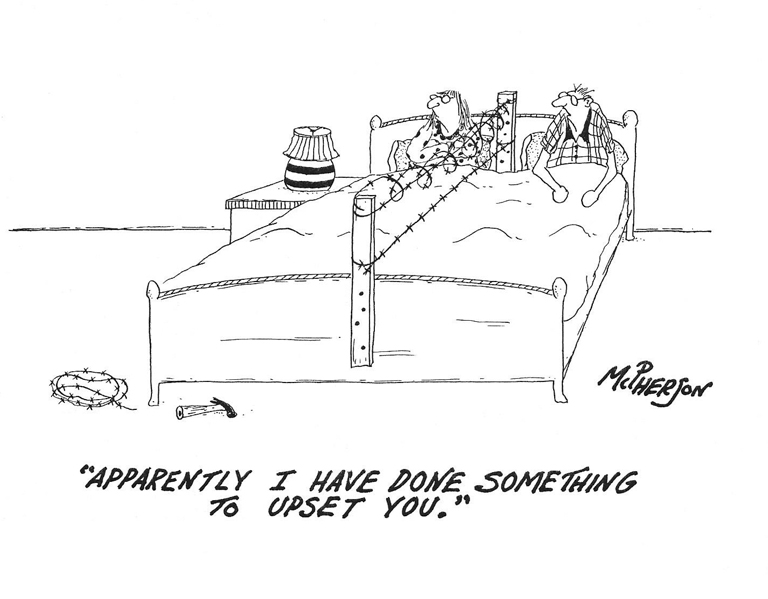
Close to Home © 1993 John McPherson. Reprinted with permission of Andrews Mcmeel Syndication. All rights reserved.
Shame and Guilt
Shame and guilt are closely connected. We think of guilt as a morally wrong action and shame as feeling badly about ourselves as the result of that wrong. Sexual guilt and shame, whether authentic or inauthentic, will restrict freedom in the bedroom.
When Annie was six years old, she and her same-age male neighbor were checking out each other’s genitals, a very normal expression of developmental curiosity. Parents found them during their exploratory play. Annie was spanked, shamed, and blamed for the activity. In contrast, her male friend was referred to as “such a young man.”
Annie came to us after several failed marriages due to her difficulty with sex in marriage. Shame and blame were so deeply connected with sexual activity as a woman that she could never focus on sexual pleasure.
By realizing the source of her issues, and by taking small steps to healing, she learned to enjoy some pleasure and accept that enjoyment as good and of God. When her shame history clicked in with flashbacks, she learned to signal her husband and change their activity to diffuse her negative thoughts.
Inauthentic shame is shame placed on you by a message similar to what Annie experienced. The message might be that to be a sexual person or to enjoy sex is shameful, so that anything sexual—even with your husband—elicits inauthentic shame.
It could also be that you experience shame as the result of what was done to you. If you were violated and felt it was your fault, you may feel inauthentic guilt that you did something wrong—and then feel shame. It was not your fault! First Corinthians 3:16-17, as stated in The Message, can be helpful: “You realize, don’t you, that you are the temple of God, and God himself is present in you? No one will get by with vandalizing God’s temple, you can be sure of that. God’s temple is sacred—and you, remember, are the temple.”
Authentic guilt and shame may be the result of choices you made that you believe were wrong, so you carry guilt about your actions. Forgiveness and release from these emotions is available. If you are a follower of Jesus, remind yourself that He gave His life so that everyone who believes in Him can be set free from failures. Whatever your faith, seek forgiveness and release of the shame so that you can experience sexual joy and fulfillment with your husband.
Some sexual behaviors could lead to either authentic or inauthentic guilt or shame. Masturbation is one of those behaviors.
You may have engaged in self-stimulation as a very natural response to the sexual drive God created in you. The behavior was not in response to pornography or any other external, unnatural stimulus, and wasn’t a withholding from your husband sexually, so it’s not condemned or warned against in Scripture. Yet you feel inauthentic guilt and shame because you were taught that this was immoral self-pleasure.
On the other hand, you may feel guilt and shame for engaging in self-stimulation in response to an external stimulus and choosing that sexual release rather than intimacy with your husband.
If you live with sexual guilt or shame, determine if it is authentic or inauthentic. Paul Tournier’s great book Guilt and Grace: A Psychological Study[39] is a helpful resource. You can take steps to be free of both guilt and shame so you can unreservedly enjoy sex with your husband.
Are you in conflict about being a sexual person? Any of the previously discussed hurts could cause an internal conflict about being sexual. Or you could have been raised in a home that discouraged or disparaged sexuality. It could be that you witnessed disturbing and inappropriate sexual behavior. These experiences may have created confusion that would make it difficult for you to see yourself as a sexual person or to enjoy sex in marriage.
It is a “Yes” and a “No” battle inside you. It’s not a conflict between you and your spouse; it’s a conflict within you. One side of you is saying sex is bad, dirty, scary, and to be avoided; the other side is hoping to enjoy sexual freedom with your husband. Work through that conflict with a professional who can help you release negative thoughts and accept your sexuality as something wonderful to be fully enjoyed with your husband.
Hurt: Sex is Physically Painful
Sex was designed for bodily pleasure. If you experience pain associated with your genitals and sex, the pain issue needs to be resolved before you engage in the activities that elicit the pain.
Work with a physician who specializes in dyspareunia, the technical term for painful intercourse. Before your appointment, define exactly where it hurts. Is it on the outside, around the opening of the vagina? At the entrance to the vagina? Along the wall of the vagina?
With a hand mirror and a cotton swab, position yourself sitting with legs spread, and use the mirror so you can see your genitals. Tap the cotton swab around the opening for the vagina. Identify where on the opening the tap triggered pain. Inform the physician. It might be at twelve o’clock, or any other point on the “clock.”
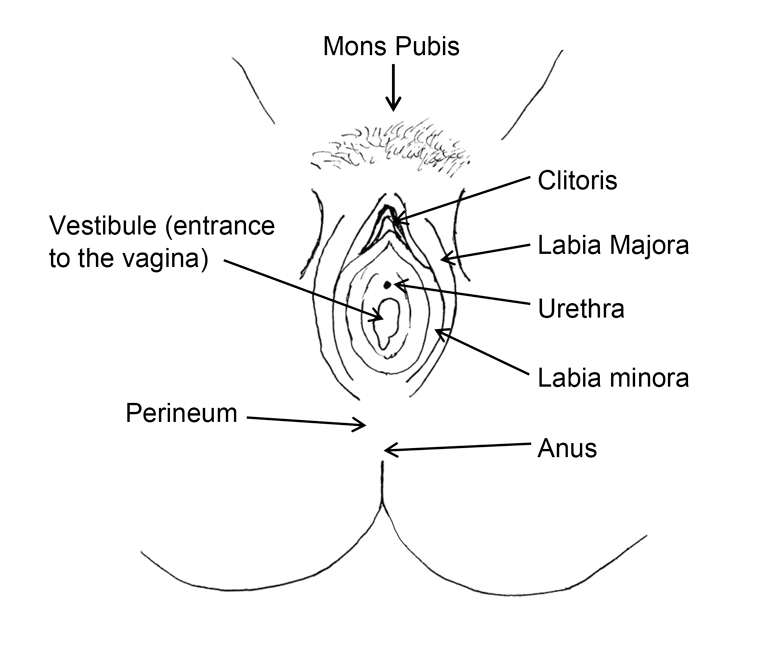
What triggers the pain? Does tight clothing rubbing between your legs cause pain? Is entry painful? Or is it thrusting that irritates? Maybe it hurts when your husband thrusts deeply? Do you experience an ache after sex?
What type of pain is it? Is it a deep stabbing pain? Or more like a rug burn along the wall of the vagina? Does it feel like tightness and stretching?
Knowing the details of the pain will aid in getting the help you need to find relief.
Vulvar Pain
The vulva consists of the female external genitals. So vulvar pain, vulvodynia, is pain in the area around the opening of the vagina, not inside the vagina.
The vulva is comprised of many different structures, the most important of which are:
- Mons pubis: A rounded mass of fatty tissue at the top of the vulva that is covered with hair.
- Labia majora, or outer lips: Two hair-bearing external folds of skin or lips.
- Labia minora, or inner lips: Two flaps of hairless skin that lie within the labia majora. The flaps meet at the top, forming the hood of the clitoris, and extend downward around the vaginal opening. They meet again below the opening of the vagina.
- Vestibule: The area between and surrounding the labia.
- Bartholin’s glands: A pair of glands, one on each side of the vaginal opening, that secrete lubricating mucus during sexual arousal.
- Clitoris: A small mass of erectile tissue at the top of the vulva that becomes engorged with blood during sexual stimulation.
Vestibulitis is an inflammation, redness, and irritation of the area around the opening of the vagina (a nonspecific irritation on the outside). Urethritis is an inflammation of the urethra, the tube that carries urine from the bladder to the outside of the body during urination. When you tap the cotton swab around the opening of the vagina, urethritis is likely to trigger a sharp pain at the twelve o’clock position, while vestibulitis is likely to trigger pain along the sides of the opening of the vagina, sometimes at the four and eight o’clock areas.
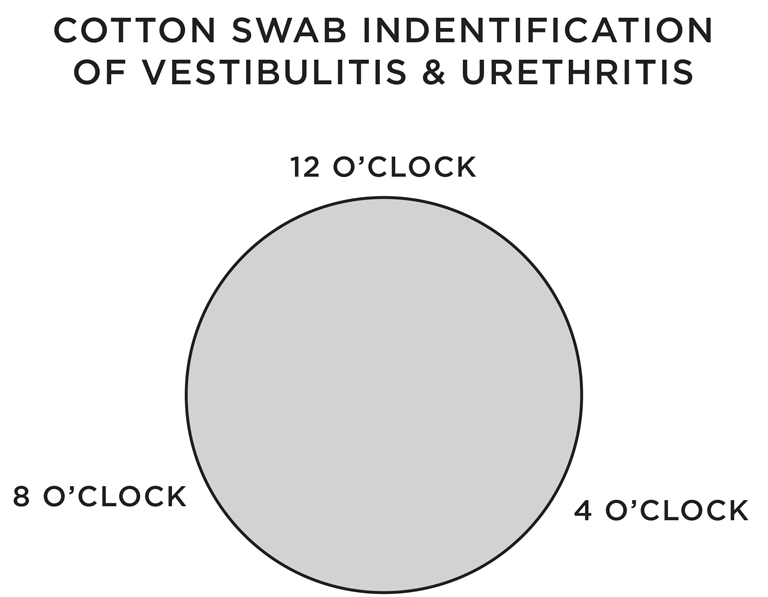
Pain of the Vaginal Barrel: Vaginitis and Vaginismus
Vaginitis is similar to vestibulitis and urethritis, except it is an internal inflammation and irritation along the vaginal wall.
Vaginismus is different from vaginitis; it is muscle tightness. The lower one-third of the vagina is either rigidly tight or spastically contracting. Treatment includes the use of graduated dilators to stretch the opening and pelvic floor physical therapy to treat the muscular issues. This very effective treatment is described in detail in our book Restoring the Pleasure.[40]
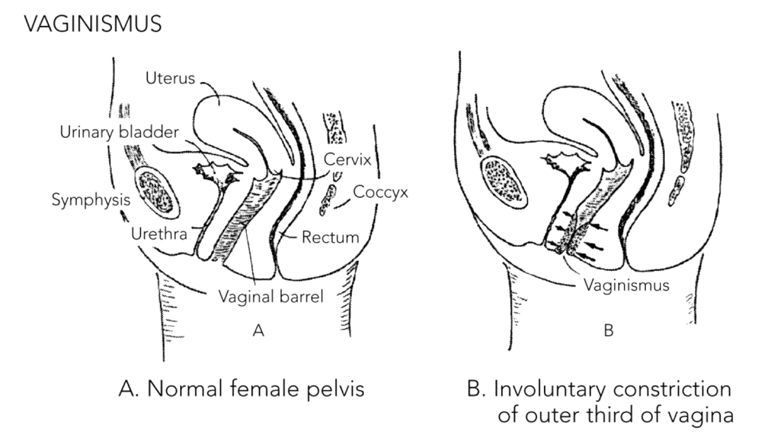
Pain of the Pelvic Cavity and Structure
This pain can be due to trauma during childbirth, other injury, or a retroverted (tipped) uterus. A retroverted uterus is tipped toward the rectum rather than toward the belly; the cervix (opening of the uterus) is hit during deep thrusting. You can prevent the pain by changing positions during intercourse to avoid hitting the cervix and doing exercises to strengthen the pelvic floor, or by working with a pelvic floor physical therapist.[41]
Do not continue to engage in any sexual activity that triggers pain, because pain perpetuates more pain. Help is available. Treatment of pain in this area has improved greatly with the rise of pelvic floor physical therapists.
Hurt: Can’t Let Go Orgasmically
Do you have difficulty letting go?
If you rarely or never experience orgasm, you may experience frustration, disappointment, pressure to try to make it happen and, eventually, lack of desire to get into a sexual experience because you want to avoid those feelings.
Men and women were created to experience arousal and release; both are involuntary responses that we can’t choose, but we can provide the right conditions to encourage them.
An orgasm is really a pelvic sneeze. You can’t make yourself sneeze, nor would you tend to stop your sneeze. It feels good to get that release and decrease the congestion in your nasal passageways. Likewise, the orgasmic release is essential to fulfilling your sexual potential, and it feels good!
To help your body learn to respond, spend some time getting to know your body. You may have done some of that already after reading Chapter 1. But in case you haven’t, start with a genital self-exam. We have explicit instructions for that in our books Restoring the Pleasure (page 164) and The Gift of Sex (pages 45–46). There are also online sites to guide you.[42]
Once you’ve done a self-exam, experiment with what brings you pleasure and what brings arousal. You may start with self-discovery or by exploring with your husband, whichever is more comfortable for you.
Consider what type of touch is best for you on your breasts, genital area, vagina, and clitoris. Many women report not getting enough of the right clitoral stimulation, so experiment and pay attention to what feels right for you. You might also explore G-spot stimulation. If you experiment on your own, share what you learned with your husband.
An orgasm is really a pelvic sneeze.
The next step is to incorporate what you have learned in your exploration during love play. Include various types of clitoral stimulation throughout.
When you are aroused—but before you reach the point where you are likely to shut down—get active! Get into the top position, thrust more vigorously, talk more, and practice the orgasmic triggers of pointing your toes, throwing your head back, grimacing your face, making noises, and closing your eyes tight or opening your eyes wide. Be conscious, deliberate, and active in going after what your body desires. If you feel like breathing, breathe more intensely; if you feel like thrusting, thrust more vigorously.
If you’ve never have an orgasm in any way, those neural pathways have not been developed. You may need practice frequently as you train your body to respond correctly. You want your body to build up enough vasocongestion to trigger the reflex of the orgasm—that’s the goal of your practice.
Are You on Medication?
A number of medications reduce sexual drive as well as hinder sexual response. SSRIs (selective serotonin reuptake inhibitors) such as Prozac and Zoloft are known offenders. All of us are affected by medication in unique ways, so be sure to look up the side effects and speak to your pharmacist or your physician about your medications.
Resolving Hurts
If you and/or your husband are experiencing hurt from the past or the present, or if you have other issues that interfere with your sexual enjoyment and response, be encouraged that there is help available—you only need to pursue it. Sexual therapy or self-help sexual retraining[43] can help you interrupt tenacious negative patterns. It can also help both of you to retrain yourselves to behave and communicate in ways that develop positive sexual patterns.
Experiencing the change will be so encouraging for you and for your husband. Sexual therapy is deeply rewarding work for us, since we see how people can change negative patterns that were learned early in life. We also hear of those who have used resources such as this book to break those patterns and recondition their bodies so they have a mutually fulfilling sex life. You, too, can find the positive responses and enjoyment God intended for you. Go for healing!